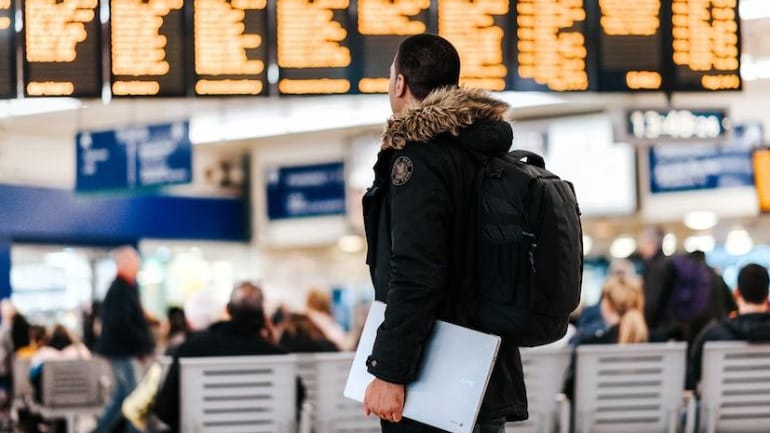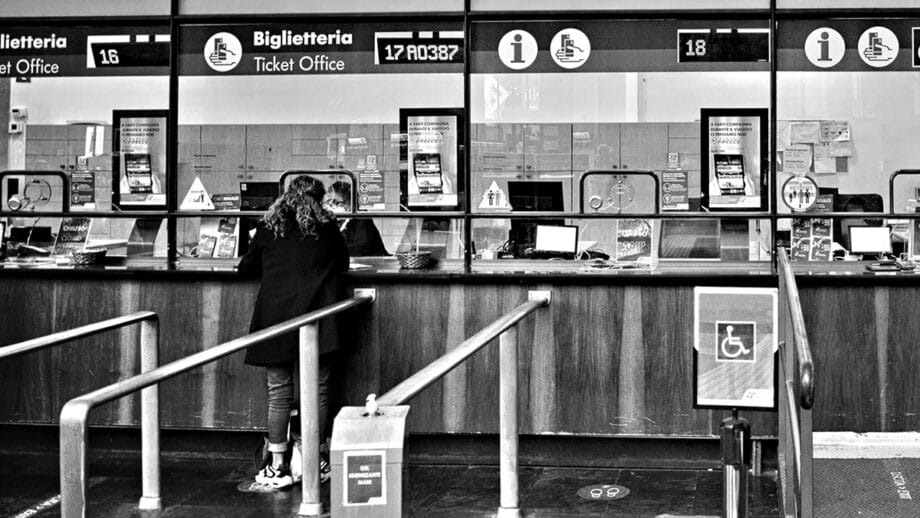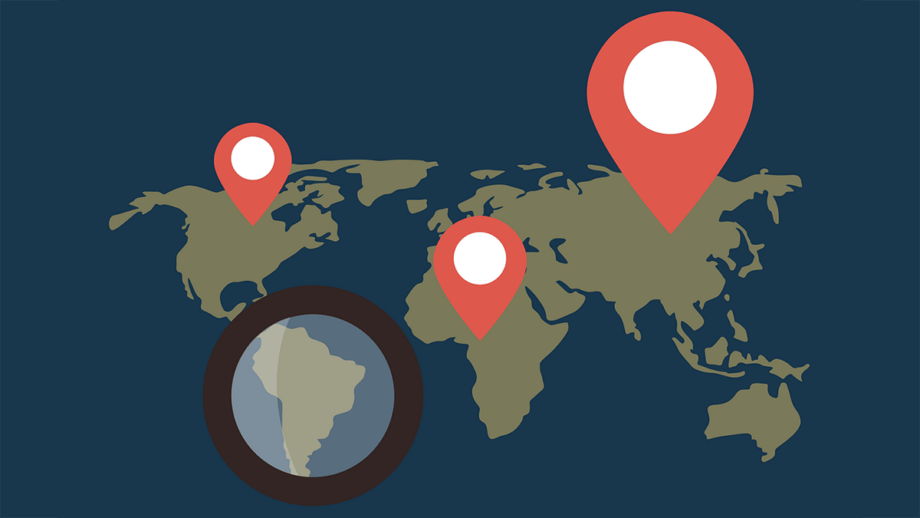Whether you’re hopping between cafés in Europe, exploring Southeast Asia, or posted up in a long-term Airbnb in Latin America, working or traveling abroad as a digital nomad comes with one massive upside: freedom. But that freedom comes with risks – especially when it comes to your digital security.
Traveling opens you up to more than lost luggage and flight delays. It also increases your exposure to cybercrime, public Wi-Fi vulnerabilities, and data theft. If you’re logging into work accounts or accessing sensitive personal information on the road, security should be top of mind. Here’s how to stay secure and protected without sacrificing your lifestyle.
Why Should Cybersecurity Be a Priority Abroad?

When you’re moving between airports, coworking spaces, and foreign countries, your devices become your lifeline – and your biggest vulnerability. You’re often dependent on unsecured networks, third-party services, and digital tools to stay connected.
According to Cybersecurity Ventures, cybercrime is expected to cost the world $10.5 trillion annually by 2025, up from $3 trillion in 2015. Hackers and scammers don’t care where you’re traveling – they care about how easy it is to intercept your data. And travelers tend to make it very easy.
If you’re accessing your bank account, client files, or business tools while abroad, one slip-up on an open network could be costly.
Beware of Public Wi-Fi Traps
Cafés, airports, and hotels often advertise free Wi-Fi, but many of these networks are unencrypted – or worse, fake. Hackers can set up rogue hotspots with similar names, tricking users into connecting and unknowingly handing over login credentials or credit card info.
Smart habits when using public Wi-Fi:
- Always connect through a VPN.
- Avoid accessing banking or sensitive work systems.
- Never allow your device to auto-connect to nearby networks.
- Turn off sharing features and file transfer settings on your device.
- Stick to websites that use HTTPS encryption.
Better yet, use a personal mobile hotspot or travel SIM, when possible, especially for remote work tasks.
Use Strong, Unique Passwords (and a Password Manager)
Reusing passwords across accounts? That’s a time bomb – especially if you’re traveling. If one site gets hacked, all your accounts are compromised.
Password security best practices:
- Use a unique, complex password for every account.
- Enable two-factor authentication (2FA) wherever possible.
- Use password managers like 1Password, Bitwarden, or LastPass to keep track securely.
- Never store passwords in plain text or unsecured notes.
Losing access to your accounts abroad isn’t just inconvenient – it can derail your ability to work, book accommodations, or even access emergency contacts.

Keep Devices and Software Updated
You might be tempted to click “remind me later” when prompted to update your operating system or apps. Don’t. Those updates often include vital security patches that fix vulnerabilities.
Before you leave for a trip:
- Update your phone, laptop, and apps.
- Backup your files to the cloud or an encrypted external drive.
- Enable remote-wipe features in case your device gets stolen.
- Disable Bluetooth and AirDrop when not in use.
Hackers often exploit outdated systems because they’re easy targets. Stay current to stay secure.
Use a VPN. Always.
One of the easiest and most important things you can do to stay secure is to use a virtual private network (VPN). A VPN encrypts your internet traffic and routes it through a secure server, masking your IP address and keeping your data safe – even on public Wi-Fi.
This is especially crucial in countries with internet restrictions or heavy surveillance. For example, travelers and remote workers headed to China will need a reliable VPN for China to access services like Google, WhatsApp, Instagram, and even Dropbox. Without one, your usual workflow could come to a grinding halt.
Choosing a VPN with a strong no-logs policy is essential to ensure your activity remains private, even from the VPN provider itself.
Benefits of a VPN include:
- Securing your connection on public Wi-Fi.
- Bypassing geo-restrictions and firewalls.
- Protecting sensitive work logins and emails.
- Keeping your browsing history private.
Don’t just use any free VPN – they can often log your data or sell it. Choose a paid, reputable service that works in your destinations and is known for privacy-first practices.
Watch for Phishing Scams
Travelers are frequent targets of phishing scams – fraudulent emails or messages designed to trick you into clicking malicious links or giving up personal information.
Red flags to watch out for:
- Unfamiliar senders with urgent tone (“Action Required!”).
- Links that don’t match the website domain.
- Requests for login credentials or payment info.
- Emails claiming to be from your airline, Airbnb, or bank asking for “verification”.
When in doubt, go directly to the official site or app instead of clicking on links. Verify travel details manually and avoid responding to suspicious messages, especially if they arrive while you’re mid-trip and distracted.

Physically Protect Your Gear
Cybersecurity isn’t just digital – it includes physical protection too. A stolen laptop, phone, or hard drive can lead to major data breaches or identity theft.
To minimize risks:
- Use a cable lock for laptops in coworking spaces or cafes.
- Don’t leave gear unattended, even “just for a second”.
- Invest in anti-theft bags and RFID-blocking wallets.
- Use biometric locks or strong passcodes on all devices.
- Back up important data daily, just in case.
Also, consider Apple’s “Find My” or Android’s “Find My Device” features, which let you locate, lock, or erase your device remotely.
Set Up Geo-Redundancy and Cloud Access
If your workflow depends on data stored locally, a stolen or damaged device could leave you stranded. Working abroad calls for redundancy – a backup system that lets you access your most critical info from anywhere.
Best practices:
- Store work files in cloud-based platforms like Google Drive, Dropbox, or OneDrive.
- Use collaborative tools like Notion, Trello, or Slack that sync across devices.
- Make offline copies of critical documents like IDs, tickets, and contact lists.
- Split backup locations – keep some in the cloud, and some on a physical device.
That way, if one tool or device fails, you’re not left scrambling.
Be Cautious with Public Charging Stations
When your phone battery’s about to die at the airport or train station, public USB charging ports seem like a lifesaver – but they can be a trap. Hackers have started using a method called “juice jacking,” where malware is installed through public charging stations. This can give attackers access to your data, passwords, or even full control over your device.
To avoid this, always use a wall charger with your own adapter and cable. Better yet, carry a portable power bank. USB data blockers are also available – they let you charge your device while physically blocking data transfer.
Avoid plugging into:
- Free charging kiosks in malls or stations.
- USB ports on rental vehicles or rideshares.
- Shared power strips at hostels or co-working spaces.
When in doubt, treat USB ports like unknown networks – convenient, but potentially risky.

Use Local SIM or Secure eSIM
Using your home mobile plan while abroad is expensive and unreliable. Many travelers rely on local SIM cards or international eSIM for connectivity, which also gives you more control over how you connect to the internet.
Benefits:
- More secure than using open Wi-Fi networks.
- Avoids high international roaming fees.
- Lets you tether your own secure connection to your laptop.
- Gives you local support if network issues arise.
Look for SIMs or eSIM providers that offer data plans with hotspot capability and good coverage in the region you’re visiting.
Know the Rules: Legal and Digital
Some countries have specific laws around internet usage, censorship, and privacy. Knowing the local rules not only keeps you secure – it keeps you out of trouble.
For example:
- In China or Russia, many global services are blocked. A VPN is necessary to use services like Gmail or Google Docs.
- In the UAE, using VoIP apps like Skype can be restricted or monitored.
- In some European countries, data privacy regulations are strict, and compliance matters even for remote workers.
Read up before you land. The last thing you want is to lose access to essential apps – or face penalties for breaking digital laws you didn’t know existed.
Final Thoughts

Working or traveling overseas can be life-changing – but with that freedom comes a new level of digital responsibility.
As cyber threats grow and data laws vary from country to country, staying secure isn’t just smart – it’s essential. Encrypt sensitive data. Use a VPN with built-in firewall protection. And build digital habits that prioritize long-term safety over short-term ease.
Because whether you’re taking client calls from a beach in Bali, drafting reports at a café in Berlin, or launching campaigns from a coworking hub in Bangkok, security isn’t optional – it’s what keeps the journey alive.
Staying safe abroad isn’t just about using the right tech – it’s about building the right routines. Cybersecurity should be as automatic as grabbing your passport or charging your phone.
Even small habits – like signing out of idle accounts, switching off Wi-Fi when it’s not in use, or checking card readers for tampering – can make a big difference.
Think of it this way: you’d never leave your passport sitting out in a shared hostel. Your digital identity deserves the same protection.
With smart tools and a little everyday vigilance, you can travel the world, work from anywhere, and stay secure – wherever the journey leads.





